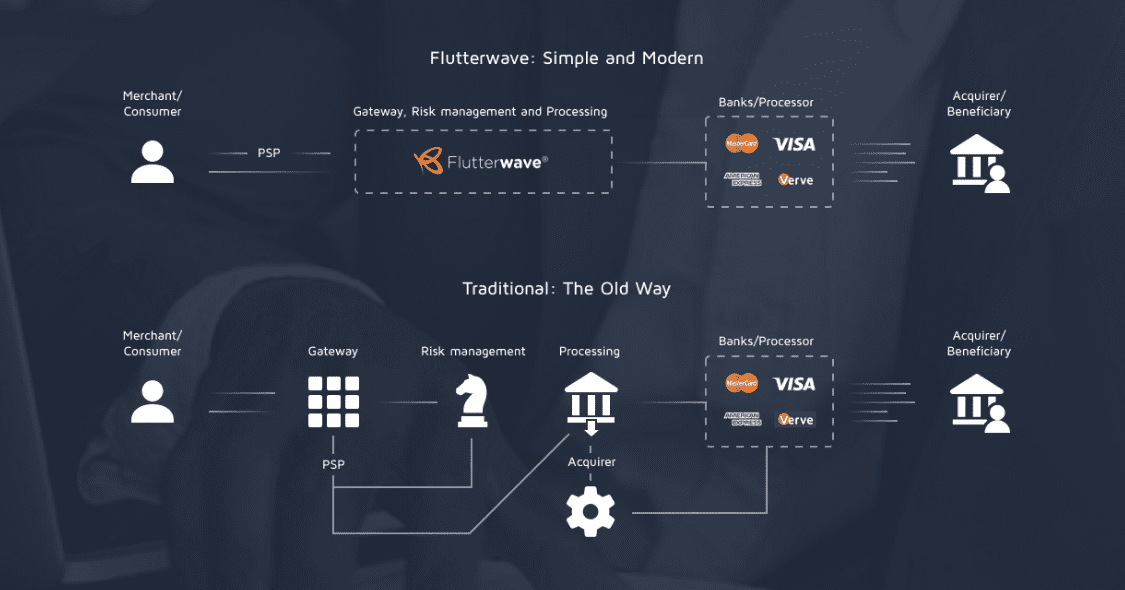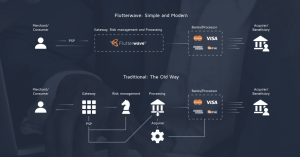Flutterwave Scandalflutterwave: The Nigerian fintech firm Flutterwave provides payment infrastructure to global merchants, payment service providers, and banks across Africa.
Flutterwave offers an extensive array of services and products catering to both online and offline commerce. These encompass online checkout, transfers, electronic commerce, invoices, and payment links.
Flutterwave is a secure and user-friendly platform designed to facilitate online payment acceptance and the creation of financial products.
How Flutterwave Works:
Online check-out Flutterwave’s online check-out features an intelligent payment ordering system and incredible speed. This is crafted to boost your revenue and offer your customers the best possible payment experience.
Flutterwave Dashboard allows you to make transfers (Payouts) in bulk or individually.
E-commerce: Flutterwave’s e-commerce software allows you to build a website for free and begin selling globally with only a few mouse clicks.
Billing: Create professional invoices and receive payment from any location.
Links Payment: Your unique payment link allows you to receive payments, one-off and recurring, from anywhere.
The Flutterwave Scandal is examined in this article. It examines the implications and details that left fintech users and the community shocked.
Flutterwave’s Controversy Revealed: Flutterwave is at the center of controversies involving allegations that it mishandled user data and compromised security. It also engaged in business practices with questionable ethics.
Additional details about the Flutterwave scandal include reports indicating a potential exposure of sensitive user data, encompassing financial and personal information.
The allegations of fraud and money laundering were specifically raised by Kenya’s Asset Recovery Agency.
What is the Flutterwave Scandal?
Kenya’s Asset Recovery Agency accused Flutterwave of fraud and money laundering.
In 62 bank accounts, the agency froze $52,5 million. The money was transferred to Flutterwave by six companies.
Flutterwave has denied these allegations and stated that any claims made about financial irregularities involving their company in Kenya were false.
Flutterwave, a company that specializes in financial technology, maintains high regulatory standards for its business.
One of the four Big Four firms audits its anti-money laundering operations and practices regularly.
To ensure compliance, Flutterwave continues to engage with regulators proactively.
According to the ARA, the money in Flutterwave’s account was received by specific foreign entities.
The funds were then transferred into specific accounts owned by the six companies and not used to settle merchants.
The fintech said Flutterwave had used its bank accounts to launder money under the pretense of offering merchant services.
It also claimed that it did not have any evidence that customers paid for services and goods through retail. The fintech also said that it had no proof of payments made to the merchants.
In a court petition, the agency asked for the forfeiture of the funds to the government. Flutterwave, however, was found not guilty of any allegations of fraud or money laundering by the ARA on November 20, 2023.
The Key Issues in the Controversy
Concerns about Data Breach: Users of Flutterwave are concerned that sensitive data could be compromised. Certain reports indicate a potential data breach, raising concerns about users being at risk for identity theft or other cybercrimes.
Security Gaps: Critics claim that Flutterwave’s security measures are not strong enough to protect user data. Security lapses have led to questions being raised about Flutterwave’s commitment to protecting user privacy.
Unquestionable Business Practices Users and experts in the industry have raised concerns about Flutterwave’s business practices. They accuse them of unethical actions that put profit before user satisfaction.
User Reaction: This controversy has caused a backlash among the users, who have expressed their concerns and displeasure on social media. Flutterwave users even threaten to stop using its services.
Flutterwave Scandalflutterwave: After Effects
Things got ugly after the Flutterwave hack controversy. Many people became worried and confused after learning of the money-laundering scam.
The Investigations Begin
Flutterwave was investigated by multiple governments for its business practices, compliance control, and other issues. There are still concerns that Flutterwave’s system could be easily abused for criminal activities. Flutterwave could face sanctions if it is proven that they were negligent or complicit.
Customer Affected
Information about Flutterwave users who send or receive money could have been compromised. Accounts should be checked for fraudulent activity. Customers’ reports of fraudulent transactions highlight the need for multi-factor authentication.
Bad Brand Reputation
Flutterwave lost trust due to the controversy. Security and ethical concerns may cause businesses and individuals to leave. To recover, Flutterwave needs to improve its security, consumer confidence, and compliance.
It may be a long time before the full impact of Flutterwave’s controversy is felt. Security, compliance, and trust are important to all financial technology companies and their customers. To protect users and prevent exploitation, it is necessary to monitor constantly and follow ethical standards. This issue highlights the importance of increased regulation and international collaboration to detect and fight large-scale fraud made possible by modern technology.
Scandal Lessons Learnt
Flutterwave’s scandal affected both customers and investors. There are numerous valuable lessons to be learned from this tragic event.
Transparency and accountability are crucial for any business. Trust is essential to building long-term relationships with consumers and investors.
To ensure that stakeholders are informed and feel confident about investing in or using the platform, companies should regularly communicate with them and provide updates. Due diligence is required when selecting a financial service provider.
Investors should carefully evaluate the reputation, past performance, and compliance of potential partners before committing.
Investigating scandals at companies is part of the process. To prevent fraud, companies must have strong internal controls. Audits and reviews are important to identify vulnerabilities in advance.
FAQs : Flutterwave Scandalflutterwave
What is the Flutterwave Scandal?
A significant data breach exposed customer-sensitive information and shook the confidence within the fintech industry.
What impact did the Fintech scandal have on the industry?
It prompted a review of the security measures across the sector.
How did Flutterwave respond to the security breach?
Flutterwave immediately acknowledged the breach and instituted enhanced safety protocols.
Can other fintech companies learn lessons from this incident?
To prevent future incidents, Fintech companies should prioritize transparency, accountability, and robust cyber security measures.
What can be done to rebuild industry trust following such scandals?
To restore trust, proactive measures are needed, like strengthened security practices, transparency in communication, and collaboration with regulatory agencies.
Flutterwave Scandalflutterwave Recovery Path is Explore
Flutterwave’s recovery path is explored, with a focus on the initiatives and strategic measures the company has implemented to gain the trust of the fintech industry and its users.
1. Flutterwave understands that open, transparent communication is essential during crises. The company is committed to regularly updating users and stakeholder groups about internal investigations, improvements in security, and corrective action.
2. Flutterwave prioritizes the improvement of its security measures in response to allegations that there was a breach of data. This involves investing in advanced cyber-security technologies, performing thorough audits on existing systems and implementing tighter access controls.
3. Flutterwave actively collaborates with regulatory authorities to comply with standards and regulations. The company wants to show its commitment by working with regulators to adhere to the highest standards of ethical behavior and security within the fintech industry.
4. Flutterwave focuses on user education and empowerment to rebuild trust. The company has launched awareness campaigns and is providing tools and resources for users to improve their digital literacy, and protect themselves from potential threats.
5. Flutterwave knows that regaining trust requires more than just words. It also involves actions. The company has taken concrete steps to respond to the issues raised by its users. It is committing to correcting any deficiencies in its operation and placing the interests of the user at the top of the list.
6. Flutterwave engages third-party firms in cybersecurity to perform independent audits on its systems as part of the recovery strategy. The company will be able to demonstrate its commitment to security by achieving industry-recognized certificates.
7. Flutterwave actively seeks feedback from users. Recognizing that it is important to involve its community of users in the recovery, Flutterwave has established channels for them to express their concerns, suggestions, and grievances. Users can now express concerns, complaints, and suggestions through the company’s channels. This shows that it is committed to hearing its users.
8. Flutterwave has begun a culture shift to address internal problems that could have led to this controversy. Employee training on data security and ethics is also being offered to help instill a culture of customer satisfaction and trust.
9. Flutterwave explores compensation and redress options in cases where the users are harmed by a data breach. The proactive approach is designed to show accountability and responsibility by demonstrating the commitment of Flutterwave to rectify any harm to users.
10. Flutterwave actively explores strategic alliances and partnerships with organizations that are reputable in the Fintech and Cybersecurity sectors. Collaboration with leading industry experts not only adds expertise, but it also shows users and other stakeholders that Flutterwave has a commitment to adopting best practices and learning from industry leaders.
11. Global Compliance Standards: Flutterwave, recognizing the international nature of its user base aligns its operation with international compliance standards. Adopting GDPR frameworks (General Data Protection Regulation), for example, will ensure user data is treated with care in compliance with global privacy standards.
12. Flutterwave has learned from recent events and is investing heavily in crisis management strategies. It involves the creation of contingency plans and regular drills as well as establishing clear communications protocols.
13. Flutterwave will release transparency reports regularly to maintain its commitment to ongoing transparency. The reports will provide information on the company’s practices in security, its incident response, as well as any notable updates. They are intended to give users and stakeholders a better understanding of Flutterwave’s commitment to accountability and improvements.
Conclusion:
Flutterwave Scandalflutterwave: While the Flutterwave scandal is a blow to the industry and an embarrassment for Flutterwave, it also provides an opportunity to reflect and improve across all sectors.
The Flutterwave scandal serves to remind us of the challenges associated with rapid growth and innovation.
It also emphasizes the importance of a balanced strategy that places a high priority on compliance, transparency, and ethical conduct.
The lessons from the Flutterwave scandal will be crucial in the future of the fintech industry.




